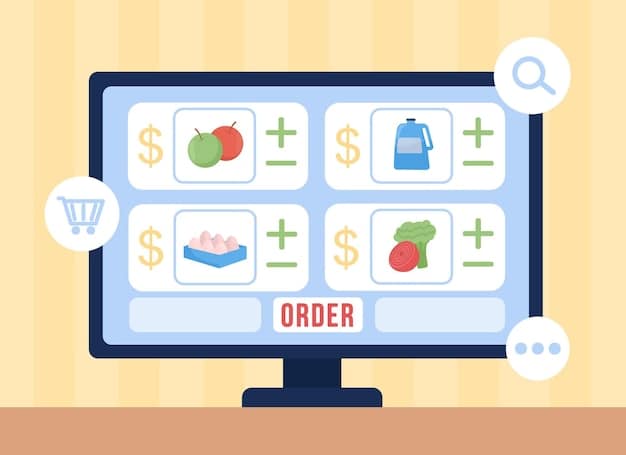Browser Extensions: Fight Price Gouging & Scams

Browser extensions that alert you to price gouging are invaluable digital tools designed to empower consumers by flagging suspicious price hikes and deceptive selling practices, ensuring fairer transactions and protecting against online scams.
In today’s dynamic online marketplace, where prices can shift in real-time and deceptive practices, including price gouging, regrettably emerge, protecting your wallet and peace of mind is crucial. Understanding how to identify and avoid inflated costs, particularly during times of high demand or scarcity, is a skill every savvy consumer needs. This is where Browser Extensions That Alert You to Price Gouging: Protect Yourself from Scams become indispensable digital allies.
The Persistent Threat of Price Gouging in E-commerce
Price gouging, the practice of raising prices to an exorbitant or unfair level during emergencies or periods of high demand, is a persistent threat in the e-commerce landscape. This unethical practice exploits consumers’ urgent needs, often leaving them with no viable alternatives. The digital age has, in many ways, amplified this problem, making it easier for unscrupulous sellers to manipulate prices across various platforms without immediate oversight. Identifying these practices can be challenging for the average shopper, as what constitutes a “fair” price often feels subjective and varies widely, especially in fluctuating markets.
Understanding the nuances of price gouging involves recognizing that it’s not simply about high prices. It’s about an unjustified and significant increase in price, often for essential goods or services, during a period of crisis or altered market conditions. While some price fluctuations are normal due to supply and demand, price gouging pushes these boundaries into exploitative territory. This can range from medical supplies during a health crisis to everyday necessities in the aftermath of a natural disaster.
Legal and Ethical Implications
The legal framework surrounding price gouging varies significantly by jurisdiction. Many states have laws prohibiting it, especially during declared states of emergency. However, enforcing these laws in the vast, borderless realm of e-commerce can be complex. Ethically, price gouging is widely condemned as it preys on vulnerability. It erodes consumer trust and can have a devastating impact on individuals and communities already struggling. Recognizing the signs of price gouging, therefore, becomes not just a matter of personal finance but also a step towards promoting a more equitable marketplace.
- Exploitative Practices: Price gouging thrives on consumer desperation, turning essential goods into luxury items.
- Economic Impact: It disproportionately affects low-income households and can prolong economic recovery in affected areas.
- Regulatory Challenges: The global nature of online commerce makes it difficult to apply local anti-gouging laws uniformly.
Consumers are often the first line of defense against these practices. By being informed and having the right tools, they can identify and report instances of price gouging, contributing to a more transparent and fair marketplace. This collective vigilance is essential, as individual cases can quickly add up, creating a significant market distortion. The challenge lies in distinguishing genuine price increases due to market forces from deliberate exploitation, a task that often requires access to historical pricing data and comparative analysis.
The rise of third-party sellers on major e-commerce platforms further complicates the issue. These sellers operate with varying degrees of oversight, and some may be quick to inflate prices during times of scarcity. The anonymity of online transactions can also embolden those looking to profit unfairly. Therefore, developing strategies and utilizing tools that empower consumers to make informed decisions becomes paramount. Transparency in pricing and access to data are key elements in countering these illicit practices, enabling buyers to assess whether a price is truly justified or an act of opportunistic greed.
How Browser Extensions Can Be Your Digital Watchdogs
In the expansive and often opaque world of online shopping, browser extensions have emerged as invaluable digital watchdogs, offering a critical layer of protection against deceptive pricing strategies, particularly price gouging. These small software modules, which can be added to your web browser, perform specialized functions that enhance your browsing experience, in this case, by monitoring product prices and alerting you to suspicious activity. They operate in the background, quietly analyzing data as you browse, making them an unobtrusive yet powerful tool for consumer protection.
The core functionality of many of these extensions revolves around price tracking. They maintain a historical record of a product’s price over time, allowing them to detect sudden, unjustified spikes. This historical data is crucial because it provides context. A high price might seem normal at first glance, but when an extension reveals it was significantly lower just weeks ago, it raises a red flag. This transparency empowers consumers, giving them the information needed to make informed purchasing decisions rather than falling victim to dynamic pricing algorithms or opportunistic sellers.
Key Features of Price Alert Extensions
While specific features vary between extensions, several common functionalities make them effective in combating price gouging and scams:
- Price History Charts: These visual aids show a product’s price fluctuations over weeks, months, or even years, making it easy to spot unusual hikes.
- Real-time Price Drop Alerts: Beyond gouging, many extensions can notify you if a product’s price drops, ensuring you get the best deal.
- Comparison Shopping: Some extensions automatically compare prices across multiple retailers, helping you find the lowest legitimate price available.
- Seller Reputation Analysis: Certain tools can integrate with feedback platforms to warn you about sellers with poor ratings or a history of dubious practices.
- Stock Level Monitoring: Being aware of stock levels can sometimes hint at artificial scarcity designed to drive up prices.
These features work in concert to provide a comprehensive view of a product’s true market value and the seller’s reliability. By flagging suspicious behavior, these extensions reduce the likelihood of impulse purchases at inflated prices. They act as automated, objective advisors, free from the emotional biases that can influence human decision-making during shopping. This automation is a significant advantage, as manually tracking prices across numerous products and websites is simply impractical for most consumers.
Furthermore, many extensions go beyond simple price tracking to identify potential scams. This might include flagging suspiciously new sellers with no reviews, unusually low-quality product images, or listings with vague descriptions. While not every anomaly indicates a scam, these alerts prompt consumers to exercise caution and conduct further due diligence before committing to a purchase. The goal is to empower users with information, enabling them to navigate the complexities of online commerce with greater confidence and less risk. They transform the passive shopper into an active, informed participant, equipped with vital market intelligence.

Choosing the Right Extension: What to Look For
Selecting the right browser extension to combat price gouging and protect against scams requires a discerning eye. With a plethora of options available, simply picking the most popular one might not be the best strategy for your specific needs. The ideal extension should not only track prices effectively but also align with your browsing habits and offer reliable security features. Evaluating an extension’s capabilities beyond its primary function is crucial, as some offer a holistic approach to online shopping protection.
First and foremost, stability and reliability are paramount. An extension that frequently crashes or provides inaccurate data is more of a hindrance than a help. Look for extensions with a solid track record, positive user reviews, and regular updates from their developers. Regular updates are a strong indicator that the developers are actively maintaining the extension, fixing bugs, and adapting to changes in e-commerce platforms, which is essential given the dynamic nature of online pricing and selling tactics.
Key Criteria for Selection
When assessing potential browser extensions, consider the following:
- Browser Compatibility: Ensure the extension works seamlessly with your preferred web browser (e.g., Chrome, Firefox, Edge, Safari).
- Retailer Coverage: Does it support the e-commerce websites you frequently use? Some extensions specialize in specific retailers, while others offer broad coverage.
- Data Accuracy and Recency: How often is the price data updated? Is the historical data reliable and comprehensive?
- User Interface and Experience: An intuitive, easy-to-understand interface makes the extension a pleasure to use, not a chore.
- Privacy Policy: Understand what data the extension collects and how it’s used. Opt for extensions with transparent and user-friendly privacy policies.
- Additional Features: Look for features like coupon integration, shipping cost analysis, or product review summaries, which add value.
Beyond these functional considerations, delve into the extension’s reputation. Forums and independent tech reviews can offer insights into real-world performance that official descriptions might miss. Pay attention to any reported issues regarding data privacy or security vulnerabilities. A reputable extension will prioritize user data protection, as they often require access to your browsing activity on shopping sites. Transparency regarding data handling is a non-negotiable aspect.
Finally, consider the level of customer support available. While browser extensions are generally self-service tools, having access to support can be invaluable if you encounter issues or have questions. A responsive development team or an active user community indicates a commitment to user satisfaction. Ultimately, the best extension is one that not only saves you money but also enhances your overall online shopping experience by providing peace of mind and acting as a trustworthy digital guardian against unfair practices and potential scams.
Real-World Scenarios Where Extensions Prove Invaluable
Browser extensions alerting against price gouging aren’t just theoretical tools; they demonstrate their immense value in a myriad of real-world shopping scenarios. Their utility becomes particularly evident when market conditions are volatile, during major sales events, or when purchasing highly sought-after items. These tools transform complex data into actionable insights, providing consumers with a clear advantage against exploitative pricing and deceptive practices that might otherwise go unnoticed.
Consider the scenario of purchasing electronics during a major sales event like Black Friday or Cyber Monday. While retailers promise “deals,” prices are often strategically manipulated in the weeks leading up to the event, sometimes even increasing temporarily before dropping to appear like a significant discount. A price tracking extension would instantly reveal this “fake discount” by showcasing the product’s price history, allowing the consumer to see if the “sale price” is truly lower than the usual retail price or merely a return to its old figure. This empowers shoppers to distinguish genuine bargains from marketing ploys, saving them from buyer’s remorse and inflated costs.
Protecting Against Crisis-Driven Gouging
Another critical application surfaces during times of crisis, such as natural disasters or public health emergencies. Historically, these periods are ripe for price gouging on essential goods like hand sanitizer, masks, batteries, or bottled water. An extension that tracks prices can immediately flag a sudden, disproportionate increase in the cost of these necessities. For instance, if a bottle of hand sanitizer that typically costs $5 suddenly appears online for $40, the extension’s alert, backed by historical data, would provide undeniable evidence of potential gouging, prompting the consumer to avoid the purchase and potentially report the seller. This swift identification can protect vulnerable populations from financial exploitation when they are most susceptible.
- Holiday Shopping: Uncovering inflated “pre-sale” prices or misleading promotions during peak seasons.
- Rare Item Acquisition: Verifying the true market value of collectibles or limited-edition items susceptible to speculative pricing.
- Home Renovation Supplies: Checking if the cost of building materials has been unfairly inflated due to supply chain issues or local demand spikes.
- Event Ticket Purchases: Though less common, some extensions can help identify price jumps on secondary markets that exceed reasonable premiums.
Furthermore, these extensions are invaluable in combating individual scams, not just systemic gouging. If a new seller lists a popular item at an unbelievably low price, but the extension reveals a history of drastic price fluctuations or points to a brand-new, unverified seller account, it prompts caution. This could indicate a phishing attempt, a counterfeit product, or a seller planning to “bait and switch.” The predictive warnings offered by these tools act as an early detection system, allowing consumers to back away before their financial information or personal data is compromised. In essence, these extensions act as a crucial layer of digital due diligence, automating the vigilance required to navigate the modern e-commerce landscape safely and frugally.
Beyond Price: Identifying Other Online Scams
While price gouging is a significant concern, the realm of online scams extends far beyond simply inflated prices. Deceptive practices can manifest in numerous forms, from seemingly harmless misrepresentations to outright fraudulent schemes designed to steal your money, identity, or both. Browser extensions that help detect vulnerabilities go beyond basic price alerts, offering a more holistic defense against the diverse array of digital threats. Understanding these broader scam types is crucial for complete online protection.
Phishing attempts, for instance, are pervasive. These scams involve fraudsters masquerading as legitimate entities (banks, retailers, government agencies) to trick you into revealing sensitive information. While many phishing attempts arrive via email or text, increasingly sophisticated ones can mimic legitimate websites. Some advanced browser extensions possess the ability to flag suspicious URLs or redirect you from known malicious sites, acting as a crucial barrier against inadvertently handing over your login credentials or financial details on a fraudulent replica website.
Types of Scams to Watch For
Consumers should be wary of:
- Counterfeit Products: Listings for knock-off goods often at prices too good to be true, designed to mimic legitimate brands.
- Bait and Switch: Advertising one product (often at a low price) to lure customers, only to sell them a different, inferior, or more expensive item.
- Subscription Traps: Seemingly free trials that automatically convert into expensive, recurring subscriptions with difficult cancellation processes.
- Fake Reviews: Artificially inflated positive reviews or manufactured negative reviews designed to manipulate purchasing decisions.
- Non-Delivery Scams: Taking payment for products that are never shipped, or shipping an empty box.
- Identity Theft Attempts: Collecting personal data through deceptive forms or compromised websites to exploit individuals’ identities.
Beyond phishing, other scams include tech support scams, where pop-ups or alerts claim your computer is infected and direct you to call a fake “support” line. While not directly related to shopping, these can still lead to financial loss or installation of malicious software. Some browser extensions can block known malicious pop-ups and redirect you from suspicious sites, adding a layer of cybersecurity defense.
Furthermore, be vigilant about suspicious payment methods. If a seller insists on unusual payment methods like wire transfers, gift cards, or cryptocurrency for typical retail purchases, it’s a major red flag. Legitimate retailers predominantly use secure, traceable payment gateways. While browser extensions may not directly prevent these payment method scams, their ability to flag overall seller trustworthiness can indirectly warn you about entities that might employ such tactics. Ultimately, a combination of savvy extension usage and general internet literacy forms the most robust defense against the ever-evolving landscape of online fraud, fostering a safer digital experience beyond mere price considerations.
Future Trends: Enhanced Protection and AI Integration
The landscape of online consumer protection is in constant evolution, driven by advancements in technology and the ever-sophisticating tactics of fraudsters. Looking ahead, browser extensions designed to combat price gouging and scams are poised to become even more powerful and intelligent, largely due to the integration of artificial intelligence (AI) and machine learning (ML). These technologies promise to transform reactive protection into proactive defense, anticipating threats rather than merely responding to them.
One major trend is the move towards predictive analytics. Current extensions largely rely on historical data to identify suspicious pricing. Future versions, powered by AI, could analyze a vast array of real-time market indicators—supply chain disruptions, news events, social media sentiment, and competitor pricing—to predict potential gouging attempts before they even become established. This proactive alerting would give consumers an even greater edge, allowing them to make purchasing decisions well in advance of anticipated price hikes or stock shortages. Imagine an extension warning you that the price of essential goods is likely to spike next week due to forecasted weather events or supply chain news.
AI’s Role in Identifying Sophisticated Scams
AI’s capability to process and recognize patterns in enormous datasets will significantly enhance scam detection. Beyond simple price anomalies, AI models can learn to identify subtle cues indicative of fraudulent listings, such as:
- Subtle Language Variations: AI can analyze product descriptions for unusual grammar, spelling, or phrasing that deviates from a legitimate seller’s typical language patterns.
- Image Analysis: AI can detect manipulated product images, inconsistencies in branding, or images used across multiple unrelated listings, indicating counterfeit goods or stock photos from elsewhere.
- Review Anomaly Detection: Machine learning algorithms can spot patterns in fake reviews, like sudden bursts of disproportionately positive or negative reviews, identical phrases appearing across multiple reviews, or reviews from accounts with suspicious activity.
- Behavioral Analysis: AI could monitor seller behavior for anomalies, such as rapid changes in inventory, sudden account creation and deletion, or unusual shipping promises.
- Cross-Platform Correlation: AI could correlate information across different e-commerce platforms and even social media to build a more complete risk profile of sellers and products.
Furthermore, personalization based on user behavior and preferences will become more refined. AI-powered extensions could learn what types of products you typically buy, what price ranges you consider normal, and even identify your susceptibility to certain marketing tactics, offering custom-tailored alerts and advice. This would make the protective features feel less generic and more directly relevant to each individual shopper.
Another exciting development will be enhanced integration with other digital tools, such as digital wallets and cybersecurity suites. This could lead to a more seamless and comprehensive protection ecosystem where your browser extension communicates directly with your payment processor to flag suspicious transactions at the point of sale, or integrates with your antivirus software for holistic threat detection. Ultimately, the future of these extensions points towards an adaptive, intelligent, and deeply integrated defense system that makes online shopping not just more affordable, but significantly safer, anticipating and neutralizing threats before they can impact the consumer.

User Best Practices for Maximum Protection
Even the most sophisticated browser extensions are only as effective as the user practices that accompany them. While these digital tools provide an invaluable layer of defense against price gouging and online scams, they are not a substitute for informed consumer behavior. Adopting a proactive and cautious approach to online shopping, combined with intelligent use of extensions, forms the strongest shield against exploitation. Empowering yourself with knowledge and diligent habits is just as critical as the technology you employ.
Firstly, it’s imperative to keep your browser extensions updated. Developers frequently release updates to fix bugs, improve performance, and, crucially, adapt to new scamming techniques or changes in e-commerce platforms. Running an outdated extension can leave you vulnerable to threats that have already been identified and patched. Enable automatic updates whenever possible, or make it a routine to check for new versions regularly. This simple habit ensures your digital watchdogs are always operating with the latest intelligence.
Complementary Security Habits
Beyond keeping extensions current, integrate these habits into your online routine for enhanced security:
- Verify and Cross-Reference: Don’t rely solely on one source of information. If an extension flags a price, cross-reference it with other retailers or independent price trackers. Read reviews from multiple sources.
- Secure Payment Methods: Always use secure payment methods that offer buyer protection, such as credit cards or reputable payment processors like PayPal. Avoid wire transfers, gift cards, or cryptocurrency for retail purchases.
- “If It Sounds Too Good to Be True…”: Be skeptical of deals that seem unbelievably good. Scammers often use enticingly low prices to lure victims.
- Check Seller Reputation: Before purchasing, investigate the seller’s history and reviews. Look for consistency and quantity of positive feedback, not just high ratings. Be wary of brand-new sellers with no history.
- Read the Fine Print: Pay attention to shipping costs, return policies, and warranty information. Hidden fees or restrictive policies are often red flags.
- Use Strong, Unique Passwords: Protect your online shopping accounts with complex, unique passwords, and enable two-factor authentication (2FA) wherever available.
Regularly review your installed extensions. Are they all still necessary? Are any of them from unknown or questionable developers? Minimizing the number of extensions to only those you trust and actively use can reduce your digital footprint and potential exposure to vulnerabilities. Each extension, while beneficial, can introduce a potential entry point for malicious actors if not properly secured or if it’s designed with malicious intent.
Finally, stay informed about the latest online scams and security alerts. Consumer protection agencies, cybersecurity blogs, and news outlets often publish information on new threats. Knowledge is your first line of defense. By combining the proactive protection offered by browser extensions with diligent, informed user behavior, consumers can navigate the online marketplace with confidence, minimizing their risk of falling victim to price gouging or complex scams, and ensuring their hard-earned money is spent wisely and safely.
| Key Aspect | Brief Description |
|---|---|
| 🛒 Price Gouging | Unfair price hikes, especially during emergencies, exploiting consumer needs. |
| 🕵️♂️ Extension Role | Track historical prices and alert users to suspicious fluctuations or deceptive practices. |
| ✅ Key Features | Price history charts, real-time alerts, comparison shopping, seller reputation analysis. |
| 🛡️ Enhanced Security | Future AI integration for predictive analytics and advanced scam detection. |
Frequently Asked Questions About Price Gouging Extensions
▼
Price gouging online refers to sellers significantly inflating prices for goods or services during periods of high demand, scarcity, or emergency. Unlike normal price fluctuations, gouging exploits consumer vulnerability, often for essential items. Browser extensions help by monitoring historical prices to flag these unjustified increases, providing consumers with crucial data to make informed purchasing decisions.
▼
These extensions typically work by tracking a product’s price history on various e-commerce websites over time. When you view a product, the extension accesses its stored data to show you how the price has changed. If there’s a sudden, abnormal spike in price unsupported by genuine market changes or retailer-wide promotions, the extension flags it as potential gouging, alerting you instantly.
▼
While highly effective against price manipulation and certain deceptive selling practices, browser extensions are not a silver bullet for all online scams. They excel at price tracking and identifying suspicious seller behavior. However, they complement, rather than replace, general cybersecurity practices like using strong passwords, being wary of phishing attempts, and maintaining updated antivirus software. For comprehensive protection, a multi-faceted approach is best.
▼
Privacy can be a concern with any browser extension, as they often require access to your browsing data. Reputable price gouging extensions typically focus on collecting anonymous pricing and product information. It’s crucial to review an extension’s privacy policy before installing it to understand what data it collects, how it’s used, and whether it’s shared with third parties. Opt for well-known, trusted extensions with transparent policies.
▼
Absolutely. Beyond detecting price gouging, many of these extensions offer features like price drop alerts, comparison shopping across different retailers, and coupon code integration. This means they can help you find the best possible deal even under normal market conditions, ensuring you never pay more than necessary for an item. Their historical pricing data also empowers you to buy at optimal times, avoiding common retail price cycles.
Conclusion
In an increasingly complex and often volatile online marketplace, empowering consumers with the right tools and knowledge is no longer a luxury but a necessity. Browser extensions that alert you to price gouging and help identify scams represent a vital advancement in digital self-defense. They transform the passive shopper into an informed participant, equipped with the data and insights needed to navigate pricing strategies and deceptive tactics. By leveraging these intelligent digital watchdogs, consumers can protect their finances, ensure fair transactions, and contribute to a more transparent and ethical e-commerce environment. As technology evolves, so too will these tools, offering increasingly sophisticated ways to safeguard our online shopping experiences. The future of online retail will undoubtedly involve a symbiotic relationship between savvy consumers and the intelligent technology designed to protect them.





